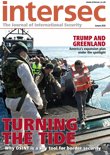Regarding radicalisation
As the UK government warns of the radicalising effects of the Syrian conflict, Robert de la Poer asks Dr Douglas Weeks whether the UK’s Prevent counter-radicalisation strategy is working
RP: Some of our readers may not be aware of the work of the Handa Centre for the Study of Terrorism and Political Violence (HCSTPV). Could you explain the focus of its research and what sets it apart from other terrorism research centres?
DW: The HCSTPV is the oldest centre of its kind in Europe. Established within the School of International Relations in 1994, the centre has functioned as an independent research facility for the past 20 years. HCSTPV broadly focuses on the determinants, manifestations, and the consequences of terrorism and other forms of political violence, including a systematic examination of the corresponding response of states, civil society, and international organisations towards radicalisation, extremism, and violence. The centre’s breadth of focus, independent status and long history of rigorous, evidence-based scientific analysis that is policy-relevant but yet independent of any partisan group has made it an attractive resource for many national and international governmental bodies and organisations seeking answers and guidance to some of the most challenging social and political issues of the past two decades.
The current director of HCSTPV is Professor Richard English. Professor English has been internationally recognised for more than two decades work on the Troubles of Northern Ireland and adds to an impressive legacy of highly influential directors at HCSTPV which include Bruce Hoffman, Paul Wilkinson, Magnus Ranstorp, Alex Schmidt, and Max Taylor. HCSTPV is perhaps also the largest research centre of its kind with 12 full time teaching staff, four full time research fellows, two honorary professors, three members of support staff and currently 16 PhD students. Thus the size of HCSTPV, the research and teaching that it does, and the expertise of its staff allows it to contribute significantly to the topics of terrorism and political violence. HCSTPV is also committed to actively engaging with both academics and practitioners alike through regularly scheduled conferences, research seminars, and workshops whereby policy relevant research can be delivered and applied to real world problems.
RP: The word “terrorism” can mean different things to different people. How does the Centre define terrorism and terrorist activity?
DW: Despite the countless definitions of terrorism that have been developed by government and within academia, there remains little consensus. Perhaps one of the reasons for that is that terrorism, like the terms “radicalisation” and “extremism”, is often politicised and/or laden with value statements that are unique to those doing the defining. As a result, most of the definitions of terrorism that exist today stem from a narrow legal or social framework that loses acceptability when applied more generally. As a result, rather than rigidly defining terrorism, describing its attributes seems more plausible. For instance, in Professor English’s book, Terrorism: How to Respond, he describes it as follows: “Terrorism involves heterogeneous violence used or threatened with a political aim; it can involve a variety of acts, of targets, and of actors; it possesses an important psychological dimension, producing terror or fear among a directly threatened group and also a wider implied audience in the hope of maximizing political communication and achievement; it embodies the exerting and implementing of power, and the attempted redressing of power-relations; it represents a sub-species of warfare, and as such it can form part of a wider campaign of violent and non-violent attempts at political leverage.” (Terrorism: How to Respond , R English, 2009, OUP)
RP: To what extent do you think local factors influence Islamist terrorist groups and individuals in the UK as opposed to external factors? What local factors should be considered key?
DW: Islamist terrorist groups and individuals in the UK focus on both domestic and international factors. While both are concerned over international issues, and the radical fringe uses international issues as their raison d’etre, the local factor that has the largest influence is domestic security policy.
Although well-intended, domestic security policy has in many cases significantly eroded the community/government relationship. Specifically, certain elements of the Pursue and Prevent workstreams have undermined security efforts rather than enhanced them. The mainstream Muslim community increasingly equates things like stop and search, surveillance activities, and detention without charge, as evidence that they have become the suspect ‘other’. Similarly, many see Prevent as stigmatising because it is perceived as government’s securitisation of an entire religious population and it is taking its toll. Combined, there has been a progressive shift in the number of law abiding mainstream Muslims who are losing their trust in government. That shift makes them more susceptible to radicalisation and indoctrination into extremist groups.
Within the radical fringe, the same reactions to domestic security policy are taking place. However, the radical fringe is leveraging its opportunity with those that are losing faith in the government within the mainstream community by offering alternative realities to the status quo. Additionally, things like proscription, the criminalisation of possessing certain books or media, the application of Terrorism Prevention and Investigative Measures (TPIMs) simply broaden the recruitment platform from which the radical fringe work.
RP: Do you agree with recent warnings that UK citizens currently fighting in Syria will pose a serious terrorist threat when they return? Do you think the security services are responding to the threat appropriately?
DW: I think that government has a right to be concerned, but I don’t share the same level of concern that officials are reporting. The reason is that UK citizens have a long history of travelling abroad and involving themselves in foreign conflicts. Places like Afghanistan, Iraq, Chechnya, Bosnia, Libya, even the Spanish Civil War are all examples of places where British citizens have gone, fought, and returned. Yet, at least to my knowledge, there are no documented cases of anyone engaging in a terrorist act once they returned to the UK.
Some statements by public officials have suggested that those who return from overseas will be subject to arrest and prosecution when they return. Clearly, governments everywhere have a responsibility to limit its citizens from engaging in any foreign conflict they choose, but the UK has been less then consistent in it application of that notion. Libya is such an example. This is further complicated in that it would imply that the UK government, whose foreign policy towards Syria has been a dynamic and iterative process, is siding with the Asad regime and labelling anyone who opposes his authority as terrorists. These are complex issues and I don’t possess the legal training to confidently say much more, but HCSTPV collectively does have the staff that can help practitioners make informed decisions on issues such as these.
RP: Do you think community-based counter-radicalisation in its current form is proving effective? Are there any aspects that you think are being overlooked or approached incorrectly?
DW: The last major revision of the UK’s “Prevent” policy was carried out in 2011. The major changes in the policy were that it would: tackle non-violent extremism; it would separate integration work from counter-terrorism work; it would develop better measuring methods; it would no longer fund those who were considered extreme in their religious beliefs; and that it would focus on the three I’s (institutions, individuals, and ideologies). Interestingly, one of the components not carried over from the 2009 version was government’s need to address the grievances that radicalising ideologues were exploiting.
As mentioned above, Prevent is considered tainted and rejected by many within the community. Although I think the concept behind Prevent was done for the right reasons, its application has been problematic since the start. When Prevent was rolled out in late 2007 and 2008, Pursue activities had already taken their toll in Muslim communities. People were generally angry because of policies like stop and search. The influx of more police into Muslims communities under the banner of engagement in projects like community mapping – to allow them to understand those communities more thoroughly – just made people more suspicious. And, despite numerous programmes developed for effective engagement, many saw them as stereotyping Muslims as a security threat. Most damaging though is the last iteration of Prevent which is perceived by many to define what is and is not acceptable in Islamic practice and belief. Thus, despite good intentions and a huge amount of money invested, Prevent has in many ways become a victim of circumstance. That is not to say that there are not good and effective people and programmes within Prevent. There truly are, but its reputation will remain tainted for the foreseeable future.
Despite the criticisms above, there is opportunity within Prevent, or at least within the concept of using effective community engagement as a counter-terrorism strategy. Understanding that government power is limited, the ultimate counter-terrorism weapon is the community. It alone has the capacity to either allow extremist ideology to expand unchecked or to severely reject its presence. That will require a new approach, however; one that is not couched in security policy but in empowerment.
RP: The UK’s prisons have been identified as hotbeds of Islamist radicalisation. Would you agree? What needs to be done to address this problem?
DW: I’ve not had the opportunity to adequately look into the radicalisation that is occurring in prisons beyond government reports that it is happening and that they are concerned. It does make sense that those in prison are likely have some degree or anti-government sentiment, and that potentially leaves them vulnerable to radicalisation.
One area that I can comment on is that one of the most effective prison deradicalisation programs was summarily dismissed after the Coalition government came into power in 2010. As mentioned in the previous discussion on Prevent, the Conservative-Liberal Democrat Coalition government chose to draw the line in the sand and not engage or fund those they considered to be extreme in their religious beliefs and practice. As a result, a group called Siraat who had worked in the prisons for several years, had the credibility to engage with extremists, and had a track record of success, had their funding cut because they were practicing non-violent Salafis. While it is understandable that government might want to establish ideological boundaries, it seems that in this case it did so at their own expense. According to contacts in the police department and Home Office, that void remains unfulfilled today.
RP: What is involved in “de-radicalisation”? Is it something that should be carried out at a governmental or a community level?
DW: De-radicalisation is a complex term. Like terrorism, there is no accepted definition of radicalisation. The obvious problem is that if radicalisation is not definable, how does one discuss undoing what is not understood in the first place? This is a core theme in my current research and I don’t want to say things prematurely, but I’m confident that I can add significant understanding to both the terms radicalisation and de-radicalisation in the coming months.
More on point to the question, the first step in understanding de-radicalisation is to understand that it is not radicalisation in reverse. Although radicalisation is typically idiosyncratic, it is a fairly straightforward and simple process, whereas de-radicalisation is far more complex. De-radicalisation requires intricate engagement across a spectrum of issues. That complexity also means that governments generally do not have the training, background, or credibility to effectively do this kind of work and must rely on community-based resources. There is an important partnership that needs to exist between government and those doing the ground level work, however, so that access and support are part of the process.
RP: What do you hope to achieve at Counter Terror Expo 2014? What are the main benefits of such events?
DW: I think the benefit of events like Counter-Terrorism Expo is they allow practitioners and academics to come together in one location to share perspectives and appreciate the complexity and resources that exist in the counter-terrorism environment. As someone who has worked in both domains, I look forward to that interaction.
Dr Douglas Weeks is a retired fire officer from southern California and a Research Fellow within the Handa Centre for the Study of Terrorism and Political Violence. He is currently working on a project funded by the European Union entitled: “The Victimisation Experience and the Radicalisation Process: An Understanding of the Perpetrator Victim Cycle Amongst Individuals Involved in Terrorism”.









